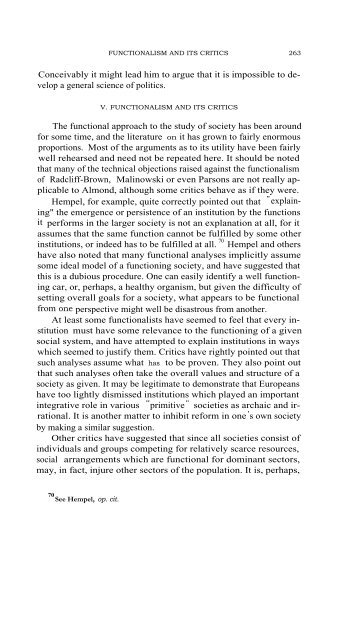FUNCTIONALISM AND ITS CRITICS - Intercollegiate Studies Institute
FUNCTIONALISM AND ITS CRITICS - Intercollegiate Studies Institute
FUNCTIONALISM AND ITS CRITICS - Intercollegiate Studies Institute
You also want an ePaper? Increase the reach of your titles
YUMPU automatically turns print PDFs into web optimized ePapers that Google loves.
<strong>FUNCTIONALISM</strong> <strong>AND</strong> <strong>ITS</strong> <strong>CRITICS</strong> 263<br />
Conceivably it might lead him to argue that it is impossible to develop<br />
a general science of politics.<br />
V. <strong>FUNCTIONALISM</strong> <strong>AND</strong> <strong>ITS</strong> <strong>CRITICS</strong><br />
The functional approach to the study of society has been around<br />
for some time, and the literature on it has grown to fairly enormous<br />
proportions. Most of the arguments as to its utility have been fairly<br />
well rehearsed and need not be repeated here. It should be noted<br />
that many of the technical objections raised against the functionalism<br />
of Radcliff-Brown, Malinowski or even Parsons are not really applicable<br />
to Almond, although some critics behave as if they were.<br />
Hempel, for example, quite correctly pointed out that " explaining"<br />
the emergence or persistence of an institution by the functions<br />
it performs in the larger society is not an explanation at all, for it<br />
assumes that the same function cannot be fulfilled by some other<br />
institutions, or indeed has to be fulfilled at all. 70 Hempel and others<br />
have also noted that many functional analyses implicitly assume<br />
some ideal model of a functioning society, and have suggested that<br />
this is a dubious procedure. One can easily identify a well functioning<br />
car, or, perhaps, a healthy organism, but given the difficulty of<br />
setting overall goals for a society, what appears to be functional<br />
from one perspective might well be disastrous from another.<br />
At least some functionalists have seemed to feel that every institution<br />
must have some relevance to the functioning of a given<br />
social system, and have attempted to explain institutions in ways<br />
which seemed to justify them. Critics have rightly pointed out that<br />
such analyses assume what has to be proven. They also point out<br />
that such analyses often take the overall values and structure of a<br />
society as given. It may be legitimate to demonstrate that Europeans<br />
have too lightly dismissed institutions which played an important<br />
integrative role in various " primitive " societies as archaic and irrational.<br />
It is another matter to inhibit reform in one ' s own society<br />
by making a similar suggestion.<br />
Other critics have suggested that since all societies consist of<br />
individuals and groups competing for relatively scarce resources,<br />
social arrangements which are functional for dominant sectors,<br />
may, in fact, injure other sectors of the population. It is, perhaps,<br />
70 See Hempel, op. cit.
















